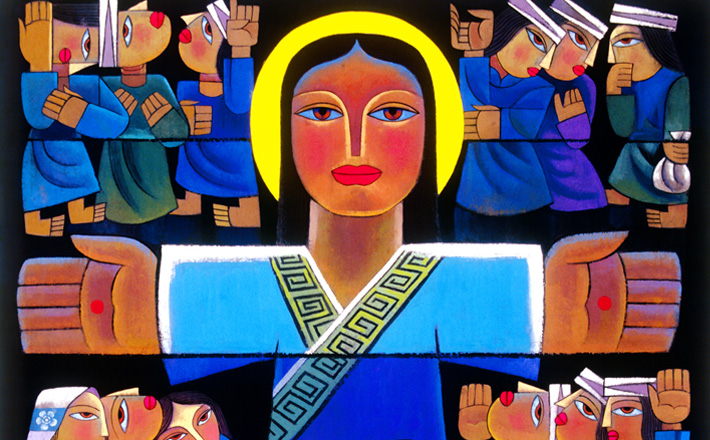Commentary on Psalm 118:1-2, 14-24
Psalm 118 is a bounty of riches. Scholars debate whether the imagined speaker is a solitary individual or a great throng.
Of course, we live our lives before God as both. The Psalm’s rousing invitation to give “thanks” should stimulate much thought. Our culture breeds us to be takers, achievers, people who feel entitled or deserving, but the Psalm tutors us in gratitude, declaring our dependence, and glorying in it.
It is sobering to recall that the Hebrew word for “thanks” (todah) never means a mere verbal expression of thanks. A todah was something tangible, something you valued and needed — your best sheep, the first ripened grain. Since God was the giver of all good things, “thanks” was a costly, precious offering to God. Churches today devise clever stewardship campaigns, but the secret of joyful giving and proper funding of religious life, is in learning to give todah-style thanks to God, not grudgingly parting with what we foolishly think we’ve achieved and is ours, but with what we humbly understand is sheer gift from God’s largesse. The grateful give generously, and it only appears to be costly to outsiders who don’t understand dependence.
Psalm 118 also features that intriguing “stone which the builders rejected becoming the cornerstone,” often quoted in the New Testament. God uses the unlikely, what the world would toss aside as useless — including you, and me and the church. Martin Luther allegedly said that God can “carve the rotten wood and ride the lame horse.” God’s glory was in a brutally executed teacher whom everybody turned away from, yet one whose grave was sealed with a stone that proved useless in keeping him dead.
The Psalm draws us into a dramatic scene on some day back in the Iron Age with worshippers crowding around the temple gate and an unforgettable cry: “This is the day the Lord has made. Let us rejoice and be glad in it.” How important can a single day be? Life is a continuous blur of days and yet everything can turn on what unfolds in a single day. That was the day my father died. That was the day she said “yes.” That was the day the doctor uttered the word “malignant.” That was the day my son came back home.
Americans are prone to say 9/11 was the day that changed history and that 9/11 is the day we will never forget. But 9/11 is like 12/7/41, or the day my grandfather died, or the day a tornado touched down and killed a friend, or a shooter rampaged through Virginia Tech — tragic days, solidly and thankfully in the past. Evil probably loves so much attention being lavished on such a dark, violent day.
More crucial and hopeful world-changing days in the past for us Americans might be not 9/11 but 7/4, when the good of independence was declared, or 1/1/1863, when the unjustly enslaved were emancipated. My children’s birthdates merit pomp and circumstance, for they are days that celebrate life, not death. Is Ground Zero sacred ground — a place where evil pumped its fist? Or is it the labor and delivery room? Or our sanctuaries where we pray and hope? Or the classroom where a student gets a bold idea? ?What dates changed history?
Christians point to Easter — when we read Psalm 118. Jews think of the Passover liberation from bondage in Egypt. In fact, Psalm 118:24 might best be translated, “This is the day on which the Lord has acted.” The Lord acted definitively in the exodus, on Christmas morning, Easter morning, and the day of Pentecost. These are the days that define both history and us.
In Israel, Psalm 118 was read on the Feast of Tabernacles, when Jews to this day build temporary little shelters, and recall their transient path through the wilderness. We have not arrived. We are on pilgrimage here; this is not our final destination. We are headed someplace, and the dawning of all that is of God is not yet.
And so how do we live in the meantime? Psalm 118 says the Lord is “my strength and my song” — not one or the other, but both. The Psalms suggest that “to live is to praise” and we think of John Wesley’s deathbed testimony: barely alive, he sang an Isaac Watts hymn he loved. “I’ll praise my Maker while I have breath.”1
Psalm 118 didn’t intend to speak of the Lord crafting each individual day. But the Christian life would be immeasurably enriched if, when the alarm clock tolls in the morning, you could hit the off button, swivel your feet to the floor, stand up, take a good breath, and say “This is the day the Lord has made; let us rejoice and be glad in it!” and perhaps reiterate this most faithful thought throughout the day.
A day can feel onerous, or perhaps like a leaky sieve, minutes slipping away, too much to do, rushing. But the day is God’s. Each day is a precious gift, not for you to consume or cram full, but to delight in God the giver of the day, to serve the God who gave you the time. Mother Teresa urged us, “Try to feel the need for prayer often during the day.”
Dietrich Bonhoeffer was right: “The beginning of the day should not be oppressed with besetting concerns for the day’s work. At the threshold of the new day stands the Lord who made it. All the darkness of the night retreats before the clear light of Jesus Christ. All unrest, all impurity, all care and anxiety flee before him. Therefore at the beginning of the day, let the first thought and the first word belong to him to whom our whole life belongs.” The ultimate outcome of this day has already been long settled because of the day the Lord acted centuries ago and so this day can become a preview, a joyful glimpse of that great day when God will bring all things to their good end.
1Richard P. Heitzenrater, Wesley and the People Called Methodists (Nashville: Abingdon, 1995), p. 308.


March 31, 2013